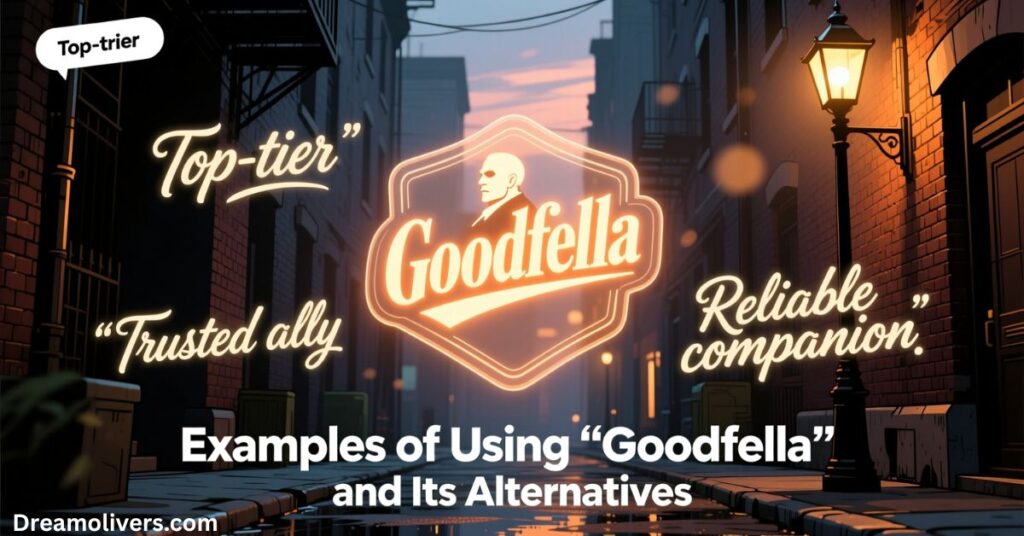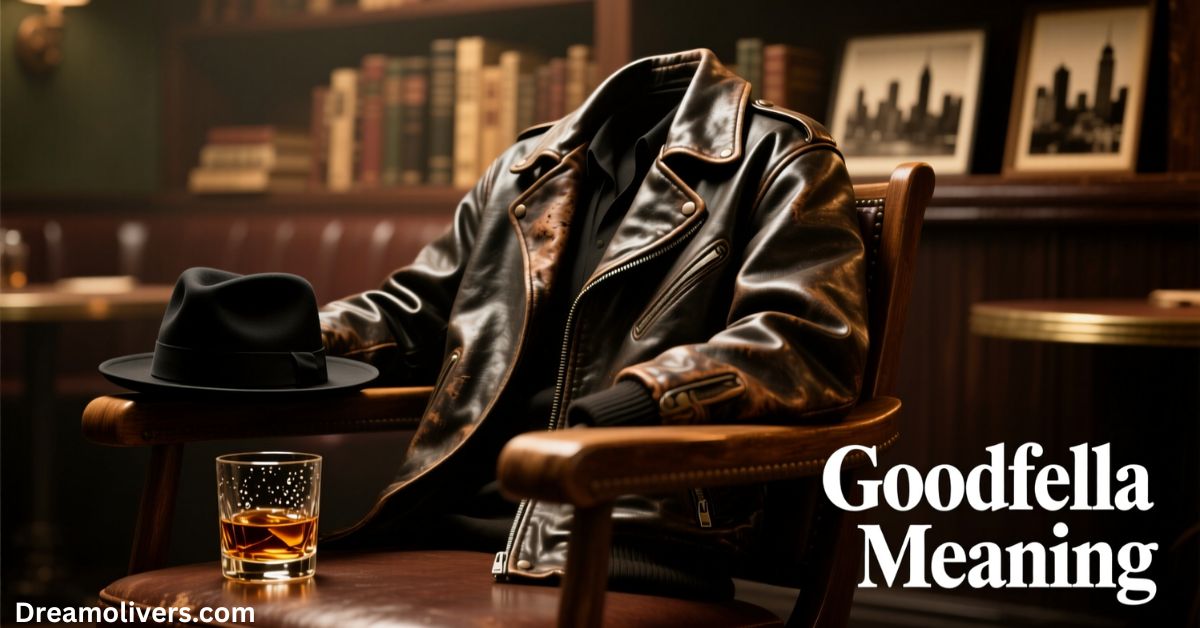The word Goodfella carries far more weight than a simple slang term—it’s a symbol of loyalty, trust, and a complex cultural identity rooted in American and Italian-American history. From the Mafia underworld to modern urban slang, this term has traveled through decades, transforming in tone, meaning, and social perception.
In this guide, we’ll explore the term definition, its semantic shift from literal to figurative meaning, and its place in both pop culture and modern communication. Let’s uncover what being a Goodfella really means in 2025.
The Real Story Behind “Goodfella”
You’ve probably heard Goodfella in a few different ways — from Scorsese’s Goodfellas (1990 film) to casual online banter like “He’s a real goodfella.” But what does it actually convey?
At its core, Goodfella (or “Goodfellow”) literally means a man of good character. Yet, over time, it gained a figurative meaning linked to organized crime, brotherhood, and loyalty among men.
The word evokes images of Italian-American mobsters, grit, and a code of honor—but it’s also evolved into a term of respect or camaraderie in everyday speech.
“You’re such a goodfella for helping me out today.”
→ In this sentence, the tone implies loyalty and friendship, not crime.
This evolution shows a semantic extension—a broadening of meaning based on context and usage.
What Does “Goodfella” Actually Mean?
The term definition of Goodfella depends heavily on context dependency. Its semantic meaning can shift from neutral to loaded depending on tone, formality, and the speaker’s intent.
Literal Meaning
Originally, Goodfella came from the phrase “good fellow”, describing a decent, respectable man—someone well-liked by others.
Cultural Connotation
Within Mafia culture, a Goodfella was a made man, someone officially inducted into the Italian-American mob—loyal to the family, bound by its code of honor, and expected to live by street smarts and trustworthiness.
Modern Meaning
Today, Goodfella may mean:
- A loyal friend or dependable man.
- Someone who commands respect in his circle.
- Occasionally, a tough or streetwise person with integrity.
This reflects how semantic shift and sociolinguistic variation transform meaning through time and use.
The Origins and Cultural Roots of “Goodfella”
The phrase emerged from early 20th-century American English, strongly tied to Italian-American communities and their depiction in media.
When Martin Scorsese released Goodfellas in 1990, the movie immortalized the word as part of pop culture. The film followed Henry Hill and his life within the mob—depicting brotherhood, loyalty, and the dark side of organized crime.
Timeline of the Term
| Era | Context | Meaning |
|---|---|---|
| Early 1900s | American slang | Friendly or decent man |
| Mid-1900s | Mafia underworld | Made man; loyal mobster |
| 1990 | Goodfellas film | Cultural icon; moral ambiguity |
| 2000–2025 | Internet slang | Loyal, solid friend; sometimes ironic |
Through this progression, Goodfella underwent semantic extension—from literal goodness to symbolic street loyalty.
Goodfella Meaning in Modern Texts and Online Chats
In digital culture, Goodfella has made a comeback, reshaped by urban slang and informal communication. On TikTok, X (Twitter), and Reddit, it often symbolizes loyalty, respect, or dependable friendship.
Common Contextual Usage
- “He’s a goodfella — never betrays his crew.” → Respect, dependability
- “Oh, you think you’re a goodfella now?” → Ironic, teasing tone
- “Watching Goodfellas again tonight.” → Cultural reference
Here, the tone and register shift between sincerity, humor, and pop culture reference.
The formality level is casual, and the politeness strategy varies: sometimes it’s admiration, sometimes gentle mockery. That flexibility is what gives the term its unique pragmatic meaning.
Different Shades of “Goodfella” in Context
The nuance of tone defines how “Goodfella” is received. Below are key context dependencies and interpretations:
| Context | Meaning | Example | Tone |
|---|---|---|---|
| Friendly | Loyal friend | “He’s my goodfella, always has my back.” | Warm, casual |
| Pop culture | Mafia reference | “That’s a real Goodfella moment.” | Nostalgic |
| Irony | Mockery | “Sure, real goodfella behavior.” | Sarcastic |
| Serious | Loyalty & trust | “He’s a goodfella — you can trust him.” | Respectful |
Notice the lexical variation in each tone—how one word adjusts to contextual usage and register.
Alternatives to “Goodfella” Based on Tone and Context
Language thrives on synonymy and alternative expressions. Depending on your setting—formal, polite, or casual—you can replace “Goodfella” with other terms that preserve similar connotative meaning.
Polite Alternatives
- Gentleman
- Respectable man
- Honorable person
- Kind fellow
- Trustworthy friend
Example: “Thank you, kind fellow, for your help today.”
→ Uses a politeness strategy appropriate for formal or gracious settings.
Professional Alternatives
- Reliable colleague
- Trusted associate
- Dependable partner
- Valued team member
Example: “John is a trusted associate who handles every project with care.”
→ Fits professional tone and formality level.
Casual Alternatives
- Buddy
- Pal
- Mate
- Homie
- Bro
Example: “Hey bro, thanks for always having my back.”
→ Reflects friendly banter and informal communication.
Each category reflects how formality level, tone, and context shape word choice.
How to Choose the Right Alternative
Choosing between Goodfella and its alternatives depends on tone and context. Use the guide below for clarity:
| Tone | Setting | Best Alternative | Example |
|---|---|---|---|
| Formal | Workplace | “Trusted colleague” | “He’s a trusted colleague I can rely on.” |
| Respectful | Community | “Gentleman” | “A true gentleman who helps without asking.” |
| Friendly | Text/Chat | “Homie” | “That’s my homie — day one!” |
| Neutral | Everyday speech | “Dependable friend” | “She’s a dependable friend in tough times.” |
| Playful | Banter | “Bro” | “Come on bro, you know how it goes.” |
Selecting the right alternative reflects tone awareness and contextual understanding, core to effective human communication.
Examples of Using “Goodfella” and Its Alternatives

Below are some contextual usage examples showing how Goodfella or its substitutes appear naturally:
- “He’s a goodfella — loyal, honest, and street smart.”
- “You’re a real goodfella for standing by me.”
- “That guy’s a trusted associate, always on time.”
- “She’s a dependable partner, never misses a deadline.”
- “Hey bro, thanks for helping me move!”
- “A gentleman like him always holds the door open.”
- “He’s a homie who’ll never rat you out.”
- “That’s some Goodfellas energy — loyal to the end.”
- “Pal, you always come through when it counts.”
- “Watching Goodfellas again tonight — classic portrayal of brotherhood.”
These examples highlight figurative meaning, tone variation, and context dependency in real-world use.
Read Also: TYSM Meaning: What It Means in 2025
Nuances and Cultural Sensitivity
Words like Goodfella carry deep cultural connotation and subtext. It’s not just slang—it’s tied to a specific heritage, particularly Italian-American identity and its portrayal in media.
When using Goodfella, awareness of sociolinguistic variation matters. In some contexts, it’s a compliment; in others, it might seem stereotypical or insensitive.
The moral ambiguity associated with the term—balancing honor with crime—mirrors code-driven masculinity in mob culture.
“A Goodfella isn’t just a gangster; he’s a man who stands by his word.”
→ This reflects moral duality and cultural reference.
Being culturally aware prevents misinterpretation and ensures respectful idiomatic usage.
Goodfella in Pop Culture and Media
No exploration of Goodfella is complete without Martin Scorsese’s Goodfellas (1990 film)—a cinematic masterpiece that redefined how people perceive the Mafia.
The film depicted Italian-American mobsters with nuance—equal parts loyalty, violence, and tragedy. It made Goodfella synonymous with loyal brotherhood and inner-circle respect.
Key Cultural References
- Goodfellas (1990) – Directed by Martin Scorsese, starring Ray Liotta, Robert De Niro, Joe Pesci.
- The Sopranos – Extended the Goodfella archetype into television, exploring morality and masculinity.
- Casino, The Irishman – Continued the cinematic exploration of trust, power, and loyalty.
Each portrayal contributed to the semantic shift—from literal meaning to symbolic cultural myth.
In modern slang, Goodfella now transcends crime; it’s about being solid, dependable, and true to your circle.
The Linguistic Journey: Why “Goodfella” Still Resonates
The word’s survival across decades shows the sociocultural influence of film on language. Goodfella blends urban culture, moral ambiguity, and street respect into one compact symbol.
Linguists would call this a semantic evolution—the way meaning expands and adapts over time. From crime films to casual memes, Goodfella lives on as a metaphor for trust, grit, and belonging.
Frequently Asked Questions About Goodfella Meaning
What does the term “Goodfella” mean?
It originally referred to a made man in the Mafia—someone loyal and respected. Today, it often means a trustworthy or loyal friend.
Is “Goodfella” a positive or negative term?
It depends on tone and context. It can be positive (loyal friend) or negative (criminal implication).
Where does the term “Goodfella” come from?
It’s derived from “good fellow”, popularized by the Mafia and immortalized in Scorsese’s Goodfellas.
Can I use “Goodfella” in formal conversations?
Not usually. In professional or polite contexts, use “trusted associate” or “gentleman.”
What are casual alternatives to “Goodfella”?
Use “bro,” “homie,” “buddy,” or “pal” depending on your audience.
Why has the term resurfaced in 2025?
Cultural nostalgia, meme culture, and renewed interest in crime dramas have revived Goodfella in online slang.
Summary: What “Goodfella” Really Means Today
In 2025, Goodfella stands at the crossroads of language evolution and cultural legacy. It’s more than just a movie title or slang—it’s a window into how people express loyalty, masculinity, and friendship.
The term’s figurative meaning, shaped by contextual usage and tone, continues to evolve across generations. Whether you use it sincerely or playfully, Goodfella carries a unique resonance—one born of brotherhood, trust, and the enduring human need for belonging.
In the end, being a Goodfella isn’t about crime.
It’s about honor, respect, and keeping your word—no matter what world you live in.

DreamOlivers, guided by Tina Hudson, is a spiritual space for inner peace and growth. Offering profound insights, it helps you connect with your higher self. Embrace wisdom and inspiration for a balanced, fulfilling life.

